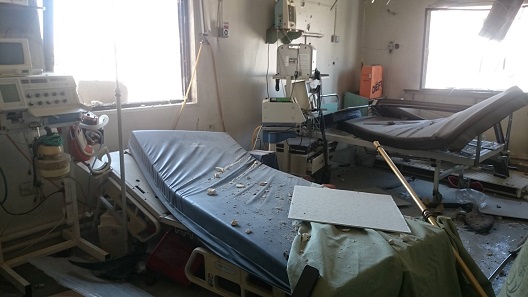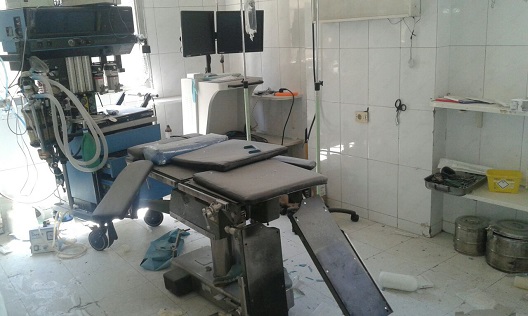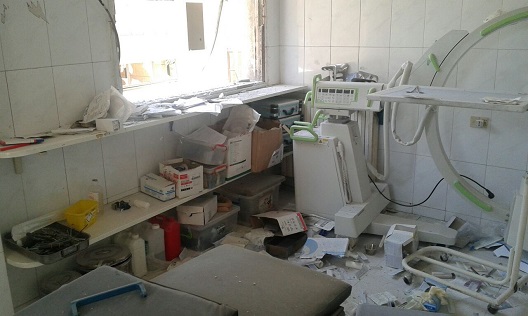 July witnessed the most extensive attacks on Syrian health facilities, most of which were located in opposition-held areas of Aleppo and Idlib provinces. The Syrian Network for Human Rights announced in a recent report that 24 hospitals and 26 ambulances had been destroyed and four medical personnel killed in one month, constituting a significant threat to the area’s population, especially in light of daily Russian airstrikes conducted in their villages and towns.
July witnessed the most extensive attacks on Syrian health facilities, most of which were located in opposition-held areas of Aleppo and Idlib provinces. The Syrian Network for Human Rights announced in a recent report that 24 hospitals and 26 ambulances had been destroyed and four medical personnel killed in one month, constituting a significant threat to the area’s population, especially in light of daily Russian airstrikes conducted in their villages and towns.
According to another report from the rights organization, on August 4, Syrian regime aircraft were responsible for targeting 13 medical facilities while Russian planes bombed 10 medical sites. The US-led international coalition also hit one facility.
The opposition-controlled eastern neighborhoods of Aleppo were the most impacted by the rising tempo of air strikes. Human Rights Watch accused Syrian authorities and their ally, Russia, of intentionally targeting four medical centers in the city of Aleppo on 23 July. These included Hakim Children’s Hospital, al-Daqaq, al-Zahra, and al-Bayan, in addition to the central blood bank, located in a densely-populated area. These locations were bombed despite the fact that the hospitals were clearly labeled as medical facilities, and no armed fighters or military centers were located in the area according to Human Rights Watch.

On August 6, Russian planes destroyed al-Amal Hospital in the town of Millis in the Idlib countryside. The hospital is run by Médecins Sans Frontières and, according to their statement, the bombing resulted in the death of four medical workers and nine civilians, including five children and two women. According to hospital director, Dr. Taher Abdelbaqi, the strikes destroyed “most of the hospital building, including the operating room, intensive care unit, and pediatric department, as well as approximately 80% of its medical equipment, ambulances, and the generator.”
Even greater suffering can be found in the city of Andan, located in the northern countryside of Aleppo, which is under the control of opposition forces and positioned close to the border with Turkey. The city’s only hospital was destroyed on July 31 and air strikes on the city are ongoing. Doaa Shikho, a nurse working in the hospital before it was bombed and who is currently wounded and ill herself, emphasized the difficulty associated with the situation. She said that citizens are now forced to cross very long distances to reach the nearest medical center.
During a press conference, Tawfik Shama’a, Chairman of the Union of Syrian Medical Relief Organizations (an NGO composed of Syrian doctors) warned of the deteriorating medical situation in Aleppo, especially in terms of the significant decline in the number of doctors in the area and scarce medical equipment.
Shama’a said that the situation in eastern Aleppo is worrying. Approximately 300,000 civilians located there are living in besieged areas with only thirty-one doctors and three dentists, meaning that there is one doctor for every 10,000 civilians.
At a press conference held at the United Nations in Geneva, Shama’a stated that at least 650 medical personnel have been killed in Syria since the war began in 2011, and 80 hospitals and health centers were bombed during the first six months of this year.

Maher Khalil, a field hospital nurse, stated that the situation in Aleppo is worrying and has surpassed being a called a humanitarian disaster after six health centers recently went out of service. The bombings target citizens on a daily basis, he noted.
The nurse added that up to 100 wounded are admitted to hospitals each day—not including patients who are sick—and some require surgery. He explained that doctors sometimes work up to 18 hours a day, which is beyond their capacity to sustain.
The greater crisis in Aleppo, according to pediatrician Mo’ayed Hussein, lies in the shortage of baby incubators. This problem emerged after the only specialized children’s hospital in the eastern part of the city was attack and two infants killed as a result.
The doctor, who currently works in the city, explained that the children’s hospital conducted no fewer than 30 caesarean births per day and was the only hospital with incubators for newborns. It received more than 10 premature children daily. With the hospital out of service, deaths will inevitably occur among newborns, he explained.
According to a report prepared by the World Health organization, only one hospital in eastern Aleppo continues to offer obstetric services, and two gynecologists are responsible for 30-35 births per day.
Wael Yaqoub, the father of a child suffering from thalassemia, said that his ten-year-old son must receive monthly blood transfusions. After Aleppo’s blood bank was destroyed and in light of the siege, there is no alternative, he explained. His son was not the only such case: The hospital used to provide this service to approximately 20 other patients with the disease.
At the same time, the situation has worsened for patients with renal disease, cancer, and diabetes due to a scarcity of medications for their conditions. The deputy director of Free Health in Aleppo, Dr. Mohamed Adnan Halaby, noted that close to 300,000 civilians are now without medical facilities and medications. He stated that the situation is getting out of control and now constitutes a humanitarian disaster, especially in light of the ongoing aerial bombardment.
15 of Aleppo’s total of 34 doctors located in the eastern part of the city signed a letter to US President Barack Obama, appealing to the United States to provide assistance to the city. The text stated: “We do not need tears, sympathy, or even prayers. We need action. Prove that you are friends of the Syrian people.”
One of the doctors who signed the letter told satellite channel al-Hurra: “The most devastating thing is when we see people who are injured and in need of equipment which we do not have and cannot access. It means that the patient will die.”
According to international law, medical facilities are granted special immunity from bombings on the condition that they are not used for military purposes. Despite the insistence of medical authorities and international organizations that their work in Syria takes international law into account, these facilities have nevertheless been a regular target for air strikes. Despite this, there is no international accountability or monitoring of what happens with regard to these facilities.
On May 12 of this year, the UN Security Council condemned attacks on medical facilities in Syria, which are war crimes and are punishable under international law. The organization called on all parties to avoid targeting such facilities.
Hosam al-Jablawi is a Syrian citizen journalist.
Image: Photo: Image of a recently damaged hospital in Syria. Photo courtesy of author.
